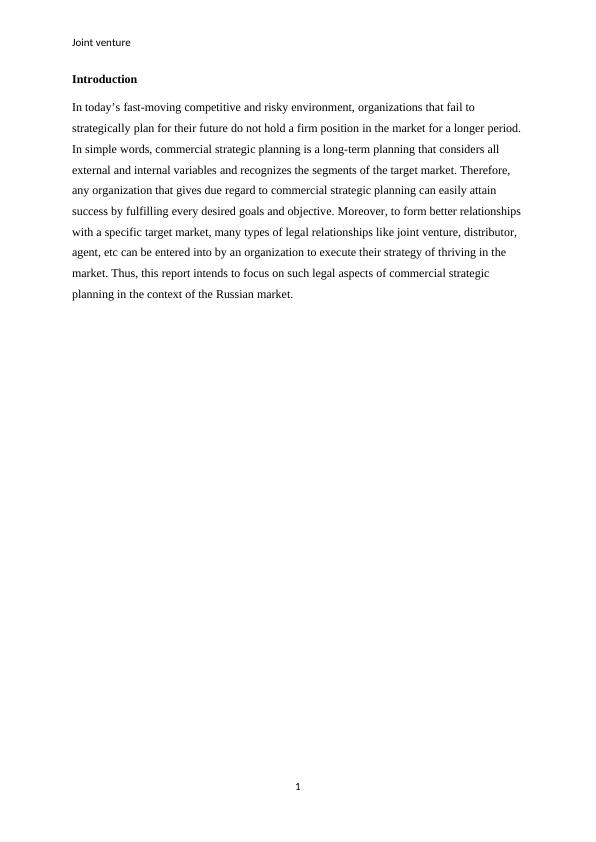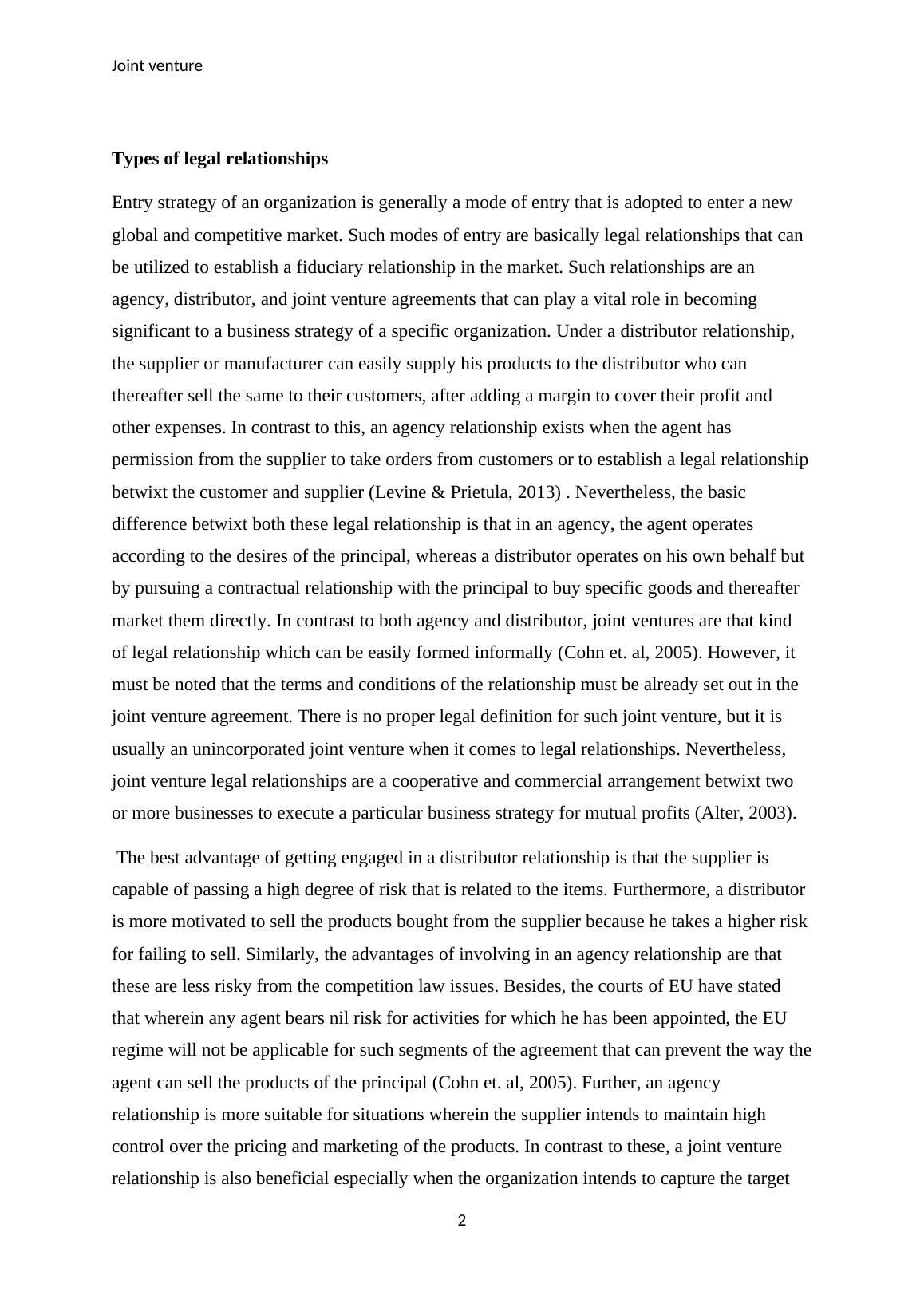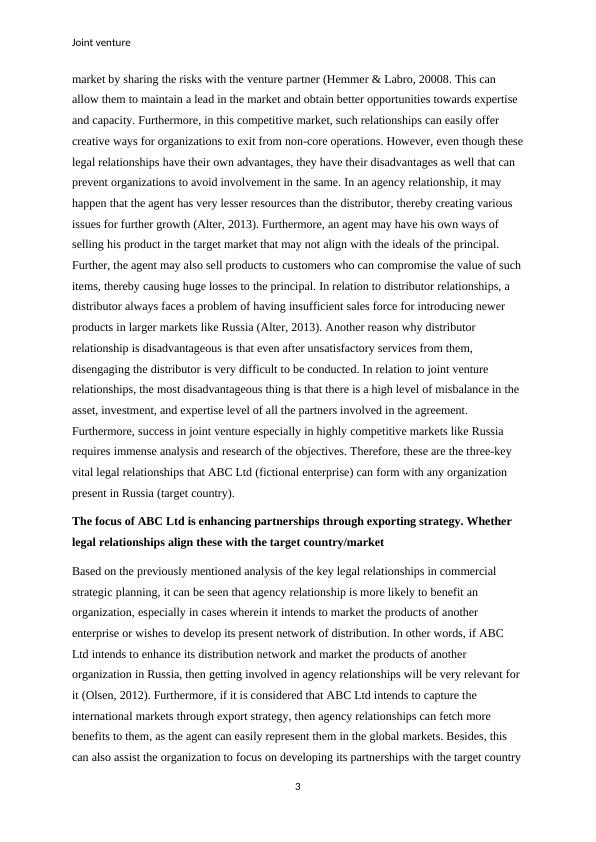Ask a question from expert
Strategic Planning Assignment
10 Pages3066 Words47 Views
Added on 2020-04-29
Strategic Planning Assignment
Added on 2020-04-29
BookmarkShareRelated Documents
Joint ventureIntroductionIn today’s fast-moving competitive and risky environment, organizations that fail to strategically plan for their future do not hold a firm position in the market for a longer period.In simple words, commercial strategic planning is a long-term planning that considers all external and internal variables and recognizes the segments of the target market. Therefore, any organization that gives due regard to commercial strategic planning can easily attain success by fulfilling every desired goals and objective. Moreover, to form better relationshipswith a specific target market, many types of legal relationships like joint venture, distributor, agent, etc can be entered into by an organization to execute their strategy of thriving in the market. Thus, this report intends to focus on such legal aspects of commercial strategic planning in the context of the Russian market.1

Joint ventureTypes of legal relationshipsEntry strategy of an organization is generally a mode of entry that is adopted to enter a new global and competitive market. Such modes of entry are basically legal relationships that can be utilized to establish a fiduciary relationship in the market. Such relationships are an agency, distributor, and joint venture agreements that can play a vital role in becoming significant to a business strategy of a specific organization. Under a distributor relationship, the supplier or manufacturer can easily supply his products to the distributor who can thereafter sell the same to their customers, after adding a margin to cover their profit and other expenses. In contrast to this, an agency relationship exists when the agent has permission from the supplier to take orders from customers or to establish a legal relationshipbetwixt the customer and supplier (Levine & Prietula, 2013) . Nevertheless, the basic difference betwixt both these legal relationship is that in anagency, the agent operates according to the desires of the principal, whereas a distributor operates on his own behalf but by pursuing a contractual relationship with the principal to buy specific goods and thereafter market them directly. In contrast to both agency and distributor, joint ventures are that kind of legal relationship which can be easily formed informally (Cohn et. al, 2005). However, it must be noted that the terms and conditions of the relationship must be already set out in the joint venture agreement. There is no proper legal definition for such joint venture, but it is usually an unincorporated joint venture when it comes to legal relationships. Nevertheless, joint venture legal relationships are a cooperative and commercial arrangement betwixt two or more businesses to execute a particular business strategy for mutual profits (Alter, 2003).The best advantage of getting engaged in a distributor relationship is that the supplier is capable of passing a high degree of risk that is related to the items. Furthermore, a distributor is more motivated to sell the products bought from the supplier because he takes a higher riskfor failing to sell. Similarly, the advantages of involving in an agency relationship are that these are less risky from the competition law issues. Besides, the courts of EU have stated that wherein any agent bears nil risk for activities for which he has been appointed, the EU regime will not be applicable for such segments of the agreement that can prevent the way theagent can sell the products of the principal (Cohn et. al, 2005). Further, an agency relationship is more suitable for situations wherein the supplier intends to maintain high control over the pricing and marketing of the products. In contrast to these, a joint venture relationship is also beneficial especially when the organization intends to capture the target 2

Joint venturemarket by sharing the risks with the venture partner (Hemmer & Labro, 20008. This can allow them to maintain a lead in the market and obtain better opportunities towards expertise and capacity. Furthermore, in this competitive market, such relationships can easily offer creative ways for organizations to exit from non-core operations. However, even though theselegal relationships have their own advantages, they have their disadvantages as well that can prevent organizations to avoid involvement in the same. In an agency relationship, it may happen that the agent has very lesser resources than the distributor, thereby creating various issues for further growth (Alter, 2013). Furthermore, an agent may have his own ways of selling his product in the target market that may not align with the ideals of the principal. Further, the agent may also sell products to customers who can compromise the value of suchitems, thereby causing huge losses to the principal. In relation to distributor relationships, a distributor always faces a problem of having insufficient sales force for introducing newer products in larger markets like Russia (Alter, 2013). Another reason why distributor relationship is disadvantageous is that even after unsatisfactory services from them, disengaging the distributor is very difficult to be conducted. In relation to joint venture relationships, the most disadvantageous thing is that there is a high level of misbalance in the asset, investment, and expertise level of all the partners involved in the agreement. Furthermore, success in joint venture especially in highly competitive markets like Russia requires immense analysis and research of the objectives. Therefore, these are the three-key vital legal relationships that ABC Ltd (fictional enterprise) can form with any organization present in Russia (target country).The focus of ABC Ltd is enhancing partnerships through exporting strategy. Whether legal relationships align these with the target country/marketBased on the previously mentioned analysis of the key legal relationships in commercial strategic planning, it can be seen that agency relationship is more likely to benefit an organization, especially in cases wherein it intends to market the products of another enterprise or wishes to develop its present network of distribution. In other words, if ABC Ltd intends to enhance its distribution network and market the products of another organization in Russia, then getting involved in agency relationships will be very relevant for it (Olsen, 2012). Furthermore, if it is considered that ABC Ltd intends to capture the international markets through export strategy, then agency relationships can fetch more benefits to them, as the agent can easily represent them in the global markets. Besides, this can also assist the organization to focus on developing its partnerships with the target country3

End of preview
Want to access all the pages? Upload your documents or become a member.
Related Documents
Importance of International Business Managementlg...
|10
|2668
|65
Economics and International Business Law- Reportlg...
|13
|2857
|232
McCarthy 4Ps Model - Doclg...
|10
|2305
|121
Types of Strategic Alliance Structures and Their Trade-offslg...
|5
|882
|256